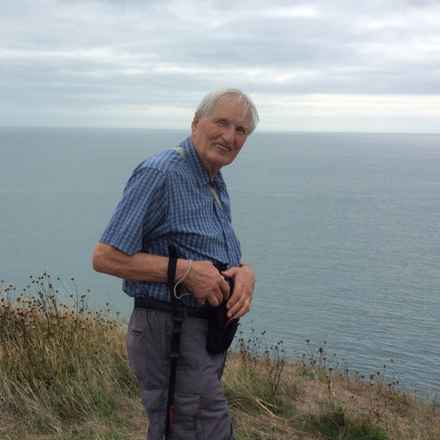“I get both joy and comfort from painting as someone with a visual impairment”
Posted: Thursday 04 September 2025
Having been forced into early retirement, John has always been determined not to be beaten by macular disease. His career as a civil engineer may have been over sooner than planned, but he has since rediscovered his passion for painting.
John was 14 when he was diagnosed with what is today recognised as Best disease. He worked until he was 57 when his condition began to affect him at work.
“I had become very slow to read and I had to have a magnifier and it became harder to do my job,” John, 90, explained. “I had to be able to read information quite fast and I couldn’t rely on a computer to help me back in those days.
“So I found I could no longer do my job properly, and that’s where I turned to painting where I suddenly had all the time in the world to do it.
“That may sound an odd thing to do as someone with sight loss but it something I am interested in. I did a little bit of painting as a teenager and my mother used to encourage me to do more. So I’ve taken it up a fairly big way later in my life.”
Now 30 years later and John has exhibited his artwork worldwide with more than 100 pieces sold. With a passion for landscapes, John takes a lot of inspiration from his travels around France where he met his wife, Lucienne.
John said: “I do get both joy and comfort from painting as someone with a visual impairment, and I get a lot of pleasure from doing it too. I have sold 125 paintings and so I wasn't, and I am not, willing to let my eyesight stop me from doing it, even if I may have to adjust my style going forward as my eyes change.”
Overcoming the challenge of sight loss
John has been open about how his eyesight has recently changed, and how it will affect his ability to paint going forward. However, he takes inspiration from his past to adapt and remain positive.
He said: “I don’t remember being concerned when they told me I had this. As a teenager I just accepted it as something that I would have to live with in my life. I inherited the condition from my father, and he coped really until around the age I began to struggle. He let it concern him and he stopped being an active man, so I think having seen how he dealt with it, that made me more determined to overcome it.
“Now my eyesight has been getting worse in the past year, so I think I may have to change my style a little bit, maybe less detailed, but if I still allow myself to adapt and enjoy what I do, then it shows there is still plenty you can do in life.”
‘Keep doing what you enjoy’
And as John looks forward to picking up the paintbrush in his south west London home once more, his thoughts turn to inspiring others with a diagnosis.
“I’d like there to be no further deterioration, so for it to be stable again would be my greatest hope. It will be too late for me, but I’m hopeful there will one day be something to treat Best disease, like there is for wet age-related macular degeneration (AMD). But I have had great support from my wife, between us we remain quite independent, and I continue to take a lot of pleasure from things in life.
“It’s about not letting your diagnosis get you down, and don’t give up on the things you enjoy.”
John’s tip for painting with sight loss
In John’s own words, his “best piece of advice is just not be put off by your visual impairment; just do what you want to do, paint what you enjoy.”
- John has been oil painting for years, having started off with watercolours. But he has found it easier to use oil paints, as you can go over something you’ve done multiple times without the same difficulty as correcting a mistake in watercolour
- John likes to get up close to his canvas, “almost sticking my nose in” he said. It’s important to let in appropriate lighting too. Try lighting from different angles if external light through the windows isn’t enough.
- John encourages others to be willing to adapt how much detail you paint if your sight changes, as has happened to him.
- Rather than using a magnifier while painting, to avoid it getting messy and for ease, John advises photographing your subject first, then zoom in and out for points of reference.
To explore John’s artwork, visit his online gallery.
Macular Society Helpline
Free information and support to those with macular disease, along with their family and friends, to help people retain their independence.
Skills for seeing
Teaching you skills that could help you continue reading, enjoying TV, staying independent and doing the things you love, with macular disease.




